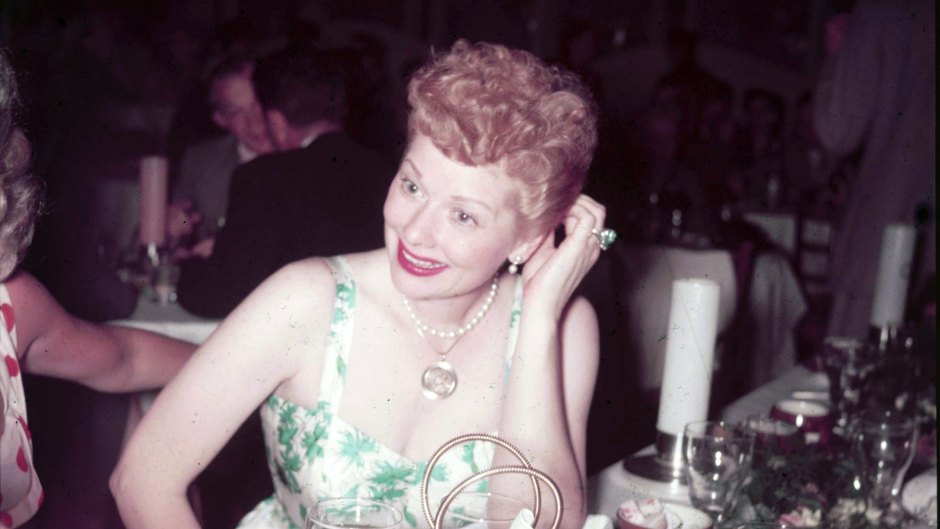
Getty Images
How Lucille Ball’s Dreams of Movie Stardom Eluded Her Despite ‘I Love Lucy’ TV Success
In 1933’s Roman Scandals, Lucille Ball kicked up her heels in a circle of gorgeous women dressed alike in blonde wigs and tunics. The ancient Rome-set musical, starring comedian Eddie Cantor, marked her big-screen debut as a Goldwyn Girl.
Like so many young starlets arriving in Hollywood in the 1930s, Lucille dreamed of being a movie star. Fate had other plans and for nearly 20 years, the future legend lingered on the cusp of film stardom. During that period, Lucille appeared in over 70 films in many genres, earning herself the nickname Queen of the B movies.
Lucille’s mother, Dede, encouraged her daughter’s dreams from a young age. “She was a pioneer spirit,” Lucie Arnaz tells Closer of her grandmother. “You could go to her for anything, she was game for anything and she had a great cackling laugh.”
Lucille had been paying her rent as a model and Chesterfield cigarette girl in New York City when she heard of the opening among the Goldwyn Girls in Los Angeles. The first thing she did was call her mother, who was supportive of her move west. “She said do it,” says Sarah Royal, author of A.K.A. Lucy: The Dynamic and Determined Life of Lucille Ball.
In many of Lucille’s earliest film appearances, she has no lines. “She would hang around the studio, so she’d be on hand when someone said, ‘Hey, we need a pretty face to stand there,’” says Royal. “She became like a chorus member in the background.”
That was okay. For Lucille, no role was too small. “I loved being part of the business. I would have swept floors just to be in it,” she said.
She found mentors to guide her, including Lela Rogers, the mother of Ginger Rogers, who ran an acting workshop on the RKO lot. “Lela took the dungarees off us and put us into becoming dresses,” recalled Lucille, who was taught by Lela how to impress decision-makers and how to speak properly. “She made us read good literature to improve our English and expand our understanding of character.”
Lela would be among the first to note Lucille’s knack for comedy, calling her “a clown with glamour.” However, not everyone saw the same spark. Lucille appeared in comedies with both The Three Stooges and The Marx Brothers, but neither caused her career to catch fire. “She could have been a great star of the silent era but after sound came in the late 1920s, studio heads insisted that actresses be beautiful and glamorous. They could not take pratfalls,” says Kathleen Brady, author of The Life of Lucille Ball.
Comedian Buster Keaton recognized Lucille’s talent too and brought her to Columbia Pictures. “They made some films where she did all these crazy, funny things like get caught in a mudslide, jackhammer a foundation, and hang from a clothesline,” says Brady. “These films didn’t take the country by storm, but they showed what she could do.”
Lucille didn’t mind taking a pie to the face if it meant getting on screen, but she didn’t burn to do comedy. “What she really cared about was that she was an actress — that was a real calling to her,” says Brady. “She said, ‘I am an actress who has learned to execute in a comedic way what my writers write for me.’”
In pursuit of her silver screen dreams, Lucille allegedly was among the thousands of women — including established stars Joan Crawford, Tallulah Bankhead and Claudette Colbert — who put their bonnet in the running to play Gone With the Wind’s Scarlett O’Hara. Lucille didn’t get the part, of course, but she did coo over Fred Astaire in Follow the Fleet and play with Henry Fonda’s affections in The Big Street.
Film expert Ben Mankiewicz calls The Big Street, Lured, and especially, Stage Door, with Katharine Hepburn and Ginger Rogers, among Lucille’s best film performances. “She’s funny. She’s smart,” he says. “Ironically, she’s the one who goes and gets a husband!”
If Desi Arnaz had not been cast in 1940’s Too Many Girls, Lucille might have continued to seek movie stardom. However, their marriage and her desire to start a family led her to move to radio and the nascent medium of television.
I Love Lucy would make Lucille one of the world’s biggest stars, yet she never got over her desire to be in movies. “She came from a generation who believed that to be a great star, you had to be a movie star,” film expert Robert Osborne said, noting that Lucille hoped her starring role in the 1974 musical Mame would be her triumph. “That was the movie that in her mind might win her an Academy Award and make her a movie star. And it didn’t,” he said.
Movie stardom would always elude her, but Lucille didn’t believe in giving up. “One of the things I learned the hard way was that it doesn’t pay to get discouraged,” she said. “Keeping busy and making optimism a way of life can restore your faith in yourself.”








































